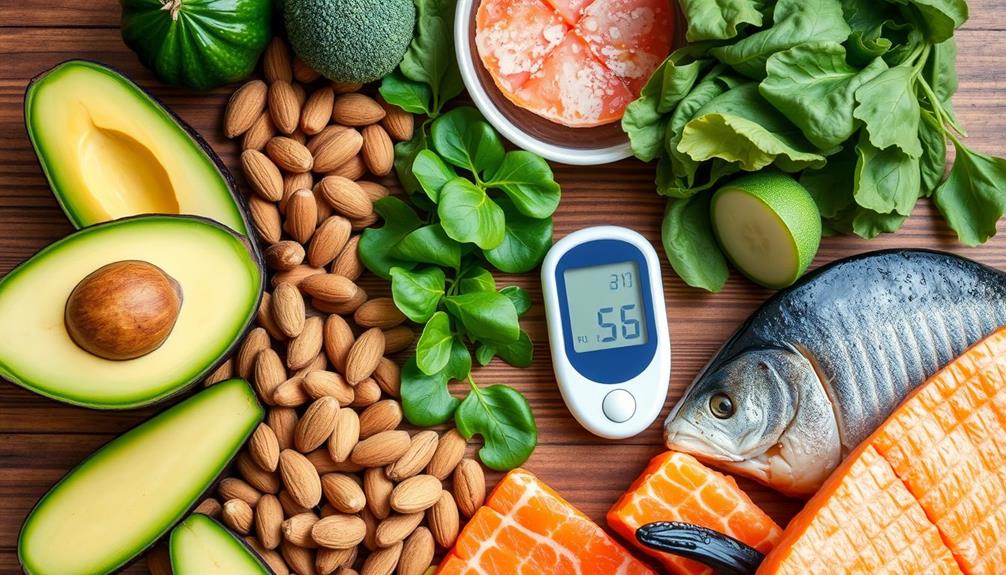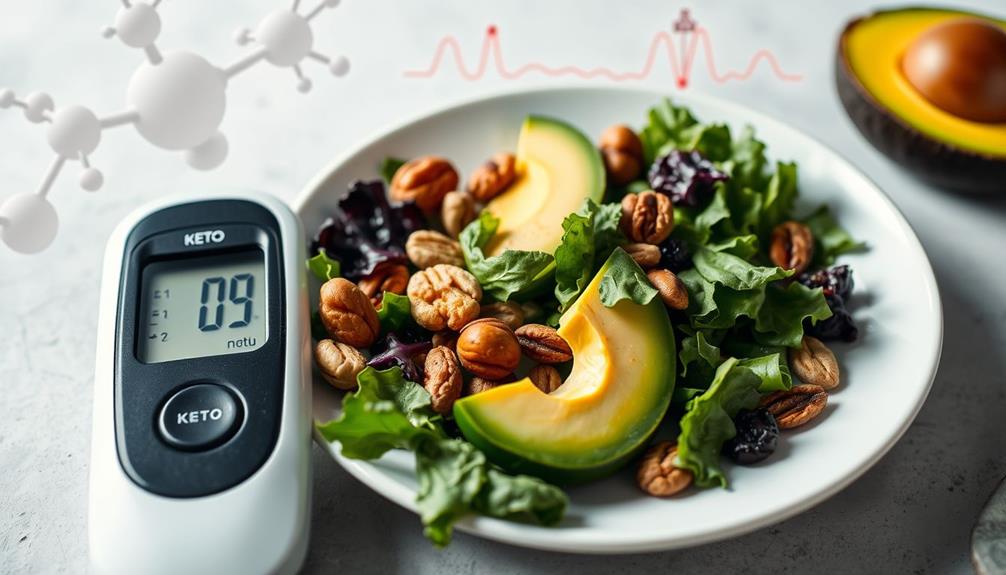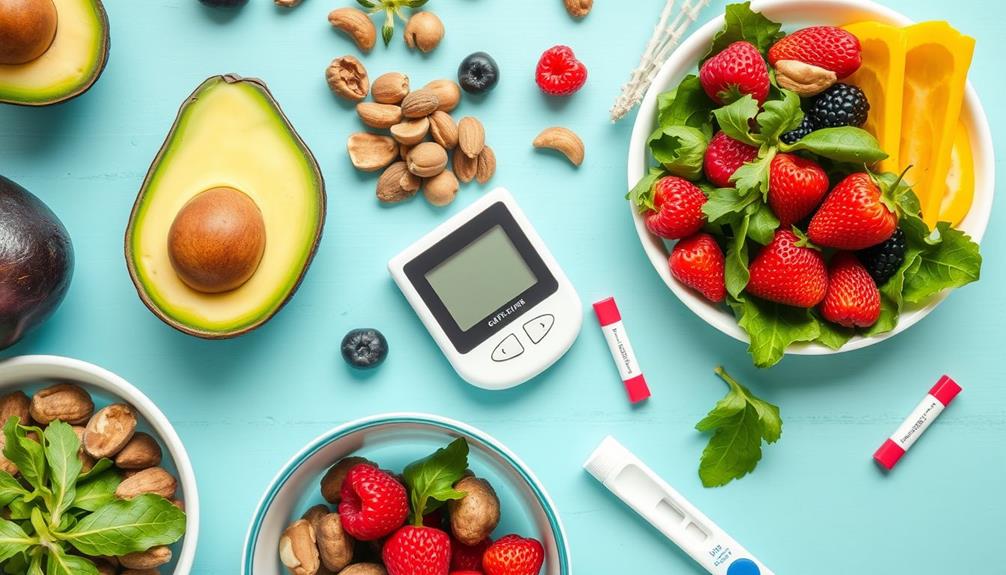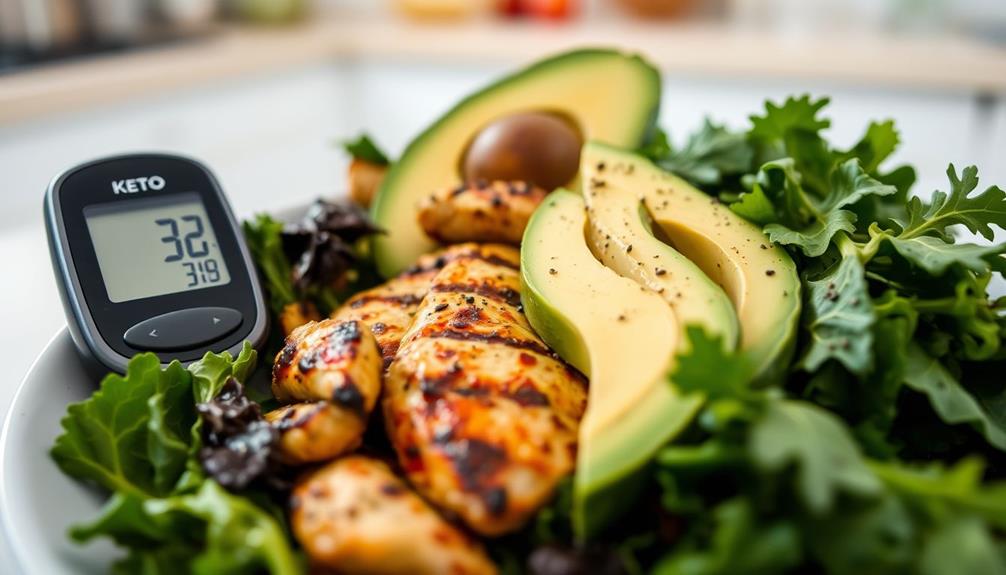The Keto diet can greatly impact your blood sugar levels. By shifting your energy source from carbohydrates to fats, it lowers glucose levels and reduces your reliance on insulin. You'll likely notice improved insulin sensitivity, which is vital for managing diabetes. This diet helps maintain stable energy, preventing spikes in blood sugar throughout the day. Many individuals have experienced weight loss and better metabolic health with Keto, enhancing their overall well-being. However, it's important to monitor your blood sugar and ketone levels regularly. Stay with me to uncover more insights about traversing the Keto journey safely and effectively. As you continue on your Keto journey, you may discover inspiring keto diet transformations from others who have successfully navigated this dietary shift. With proper education and guidance, you can harness the power of the Keto diet to improve your blood sugar management and overall health. Embracing this lifestyle change can lead to profound changes in your well-being and vitality, empowering you to take control of your health in a sustainable way. Remember to seek out support and information to make the most of your Keto experience.
Key Takeaways
- The keto diet lowers blood glucose levels by shifting the body's energy source from carbohydrates to fats, promoting ketosis.
- Enhanced insulin sensitivity through the keto diet aids in better blood sugar control and reduces reliance on diabetes medications.
- Stable energy levels provided by a low-carb diet minimize blood sugar fluctuations, preventing spikes and crashes throughout the day.
- Weight loss associated with the keto diet improves metabolic health, which is crucial for managing type 2 diabetes effectively.
- Regular monitoring of blood sugar and ketone levels is essential to ensure safety and prevent risks like hypoglycemia or diabetic ketoacidosis.
Understanding the Keto Diet

In the world of dietary choices, understanding the Keto diet is essential for anyone looking to improve their health, particularly for blood sugar management.
This low-carbohydrate, high-fat diet focuses on inducing ketosis, where your body burns fat for energy instead of carbs. By considerably cutting down on carbohydrates, you'll lower your blood glucose levels and reduce your reliance on insulin.
This dietary shift can enhance your insulin sensitivity, making it easier to manage diabetes symptoms. You'll also experience more stable energy levels throughout the day.
As you embrace the Keto lifestyle, you'll find it not only supports your weight loss goals but also promotes overall metabolic health, benefiting your long-term wellness journey.
Mechanism of Blood Sugar Control

Keto's impact on blood sugar control primarily hinges on its ability to shift your body's energy source from carbohydrates to fats. By drastically reducing carb intake, your body enters ketosis, where it burns fat for fuel. This metabolic state can lead to improved insulin sensitivity and lower blood sugar levels for some individuals, making it an attractive option for those looking to better manage their diabetes or prediabetes. However, it’s important to note that not everyone will experience the same results, and individual responses to the keto diet can vary. Additionally, it’s essential to focus on real keto transformations, which include sustainable, long-term lifestyle changes rather than quick fixes or extreme measures.
This shift lowers your blood glucose levels, reducing the need for insulin. As a result, you experience enhanced insulin sensitivity, which helps stabilize your blood sugar.
Additionally, fewer fluctuations in blood sugar mean less reliance on diabetes medications over time. Overall, this metabolic change supports consistent energy levels and improves your body's response to glucose.
You'll find that by adhering to the Keto diet, you're better equipped to manage your blood sugar effectively and maintain a healthier lifestyle.
Key Benefits for Diabetes

How can the Keto diet transform your diabetes management? By drastically reducing carbohydrate intake, you can lower your blood sugar levels and enhance insulin sensitivity. This shift not only helps you manage your diabetes more effectively but also promotes weight loss, which is essential for type 2 diabetes.
Here are some key benefits:
| Benefit | Description |
|---|---|
| Improved Insulin Sensitivity | Reduces insulin resistance for better blood sugar control. |
| Weight Loss | Aids in shedding excess pounds, improving metabolic health. |
| Stable Energy Levels | Provides sustained energy without the spikes in blood sugar. |
With these advantages, the Keto diet can be a powerful tool in your diabetes management strategy.
Risks to Consider

The Keto diet offers numerous benefits, but it's vital to be aware of potential risks before diving in.
Hypoglycemia is a concern, especially if you're taking diabetes medications, as the drastic reduction in carbs can lower your blood sugar too much.
Diabetic ketoacidosis (DKA) is another serious risk, particularly if your insulin levels aren't well-managed.
You might also face nutrient deficiencies due to the limited food variety, which can impact your overall health.
Regularly monitoring your blood sugar and ketone levels is important to avoid complications.
Consulting with a healthcare professional before starting the diet and throughout your journey can help tailor the approach to your specific health needs, ensuring safety and effectiveness.
Essential Safety Measures

Safety measures are essential when commencing the Keto diet to guarantee you navigate its challenges effectively.
Here are some vital steps you should follow:
- Consult a Healthcare Professional: Get personalized guidance tailored to your health needs before starting the diet.
- Monitor Blood Sugar and Ketone Levels: Regular checks help you stay aware of your body's response and avoid complications.
- Focus on Nutrient-Dense Foods: Prioritize whole foods to prevent deficiencies and make sure you're getting the nutrients your body requires.
- Stay Hydrated: Drink plenty of water to support metabolic processes and overall health.
Nutritional Awareness Strategies

Recognizing the importance of nutritional awareness is essential when following the Keto diet, as it directly impacts your health and well-being.
To achieve success, you should monitor key vitamins and minerals, ensuring you're meeting your nutritional needs while staying low-carb. Utilizing apps or food diaries can help track your intake and maintain adherence to the diet.
Incorporating keto-friendly snacks can satisfy cravings without jeopardizing your goals. Don't forget to prioritize whole foods, as they provide essential nutrients that support energy levels.
Regularly checking blood sugar levels will also keep you informed on how your body responds to different foods.
Integrating Lifestyle Changes

Integrating lifestyle changes is essential for maximizing the benefits of the Keto diet and achieving long-term health goals.
To enhance your journey, consider these key strategies:
- Stay Active: Incorporate regular exercise, like walking or strength training, to boost insulin sensitivity and support weight management.
- Plan Meals: Prepare your meals in advance to guarantee you stick to your Keto goals and avoid reaching for unhealthy options.
- Hydrate: Drink plenty of water to help with digestion and maintain energy levels throughout the day.
- Monitor Progress: Regularly check your blood sugar and ketone levels to stay informed about how your body is responding to the diet.
Frequently Asked Questions
Can the Keto Diet Be Followed by Vegetarians or Vegans?
Yes, you can follow the keto diet as a vegetarian or vegan. Focus on high-fat plant foods like avocados, nuts, seeds, and low-carb vegetables. Planning meals carefully guarantees you meet your nutritional needs while staying in ketosis.
How Quickly Can I Expect to See Changes in Blood Sugar Levels?
You might notice changes in your blood sugar levels within days of starting the diet. As your body adapts, keep an eye on your readings; improvements can be significant, but individual experiences vary widely.
Are There Specific Foods to Avoid on the Keto Diet?
When following the Keto diet, you should avoid high-carb foods like bread, pasta, rice, sugary snacks, and starchy vegetables. These can hinder ketosis and impact your progress, so stick to low-carb, high-fat options instead.
How Does Stress Affect Blood Sugar While on Keto?
Stress can spike your blood sugar levels, even on keto. When you're stressed, your body releases cortisol, which raises glucose. Managing stress through mindfulness or exercise helps maintain stable blood sugar while following the diet.
Can Intermittent Fasting Complement the Keto Diet for Better Results?
Yes, intermittent fasting can complement the keto diet by enhancing fat burning and improving insulin sensitivity. You'll likely experience better energy levels and more stable blood sugar, making it a powerful combination for weight management.
Conclusion
Incorporating the Keto diet can be a game-changer for your blood sugar balance. By embracing this low-carb lifestyle, you not only boost your body's ability to burn fat but also foster fantastic improvements in insulin sensitivity. However, it's essential to remain vigilant about potential pitfalls. With proper planning and proactive healthcare support, you can confidently cultivate a healthier you. So, gear up for this glorious journey towards better blood sugar management and vibrant well-being!









